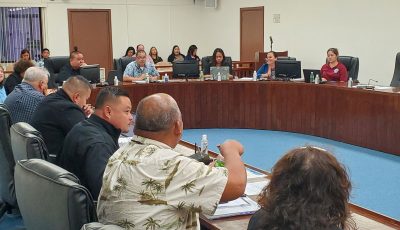PSS restores 80 hours
The Public School System is going back to 80 hours starting Feb. 1, 2021.
The Board of Education unanimously voted yesterday to restore the work hours of PSS employees, teachers and staff who were making 64 hours back to 80 hours.
BOE members all voted for this motion at their regular board meeting via Google Hangouts last Jan. 28.
Speaking at the board meeting, PSS Finance director Arlene Lizama said there are 108 PSS employees who are currently earning 80 hours and all of them are critical employees who needed to work to make sure that PSS employees get paid. These include staff at the Human Resource Department, Finance Procurement Office, And Networking Technology.
It was learned at the same presentation that there are a total of 713 employees who are currently making 80 hours.
Once PSS goes back to 80 hours, their total annual personnel cost will go from $30,492,945 to $34,763,493, she added.
PSS Federal Program officer Tim Thornburgh affirmed that of the $61.7 million Education Stabilization Fund grant from the U.S. Department of Education, $34.7 will cover the cost of the employees’ salaries.
“If I could add a piece of absolute clarity, remember that they [ESF] are paying for all the utilities, they’re paying for all the accounts payable, and then they’re paying for some staff, too,” said Thornburgh.
BOE chair Andrew L. Orsini said the real question is sustainability of the federal funds. “I think the real question here is the sustainability, based on these federal funds that we have now,…but can it hold until this one school year,” said Orsini.
Because teachers get paid during the summer, there are worries if the federal funding will be able to sustain the summer pay. Thornburgh was quick to shut down any worries, because PSS does have sufficient funds to cover paying staff for two years.
BOE vice chair Herman B. Atalig said that they spent four hours with the finance committee to look over the cost. “We looked at every corner of where we could fit, in the event that we face a reduction in local and federal [funds]. …With the two years, I think it is sustainable,” said Atalig.



























